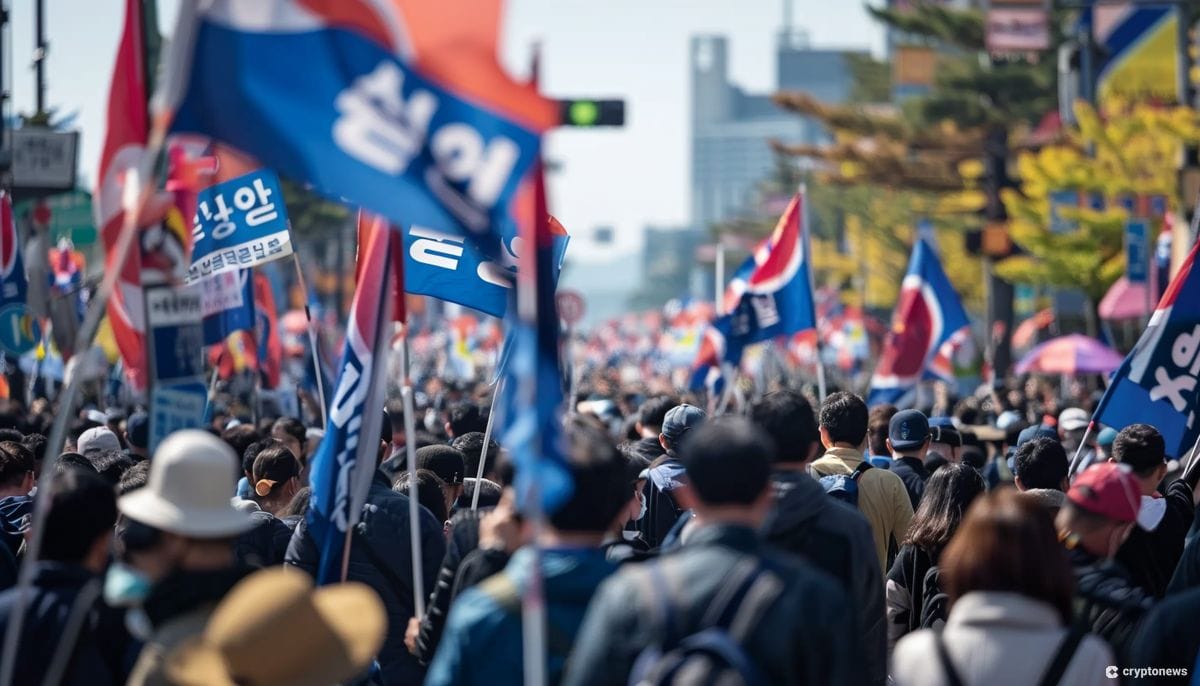South Korean Political Parties Present Policy Promises as Crypto Investors Emerge Key Voting Group

With only three weeks remaining until the general election, South Korea’s rival political parties are vying for support from crypto investors, who have emerged as a key voting group.
According to local media outlet JoongAng Daily, the parties recognize the significance of addressing cryptocurrency-related policies amid the surging popularity of this nascent industry. Notably, South Korea is also seeing a rise in numbers from crypto investor voting groups.
Bitcoin’s price surge has captured public attention, with the cryptocurrency trading at 92.1 million won ($68,654) on Upbit, the country’s largest cryptocurrency exchange.
Although the price has dipped from its recent peak of 105 million won, it still represents a substantial increase of over 60% compared to the beginning of the year.
Both Parties Present Crypto Policy
Both the conservative People Power Party (PPP), aligned with the Yoon Suk Yeol administration, and the rival Democratic Party (DP) have presented their policy proposals to institutionalize crypto-assets, albeit with differing approaches.
The PPP, in its policy pledges issued on Monday, vowed to extend the tax deferral on crypto-assets, which is set to expire in January 2022.
Originally, a 20% taxation rate on investment gains exceeding 2.5 million won was planned for implementation in January 2022 but has been delayed twice.
The PPP also plans to introduce additional legislation to enhance investor protection and establish a committee dedicated to monitoring the industry and safeguarding investors.
They also aim to establish standard rules for regulatory filings by crypto exchanges.
On the other hand, the liberal DP proposes a more progressive stance on cryptocurrencies.
In February, they announced their plan to approve the issuance, listing, and trading of cryptocurrency-backed ETFs. The DP also pledged to increase the deduction limit for capital gains from crypto-asset investments to 50 million won, up from the current 2.5 million won.
Furthermore, they pledged to ban crypto trading by lawmakers while parliament is in session, following the departure of Representative Kim Nam-kuk, who left the party amidst controversy surrounding his cryptocurrency transactions.
However, the finer details of these policies are yet to be refined.
President Yoon’s recent pledge to eliminate the planned capital gains tax on stock investment gains, scheduled to take effect in 2025, raises concerns about potential unfair treatment regarding taxes on gains from crypto-asset investments, possibly affecting voting descisions.
South Korea Could Allow Spot ETFs
Earlier this month, South Korea’s chief of the financial watchdog revealed that authorities are discussing the potential approval of spot Bitcoin exchange-traded funds (ETFs) in the country.
Lee Bok-hyun, governor of the Financial Supervisory Service, said in a recent radio interview that there are differing opinions among authorities.
While some, like himself, hold a positive stance on virtual assets, others are more cautious. Lee emphasized the need to consider all perspectives and engage in internal discussions.
“Among authorities, I am one of those who are positive about virtual assets, while there are others who are wary, and we need to hear their opinions as well. We are internally discussing it.”
As of now, spot Bitcoin ETFs are not available for South Korean crypto investors.
In January, the country’s financial authorities announced that they had no plans to regulate the sales of Bitcoin futures ETFs.




